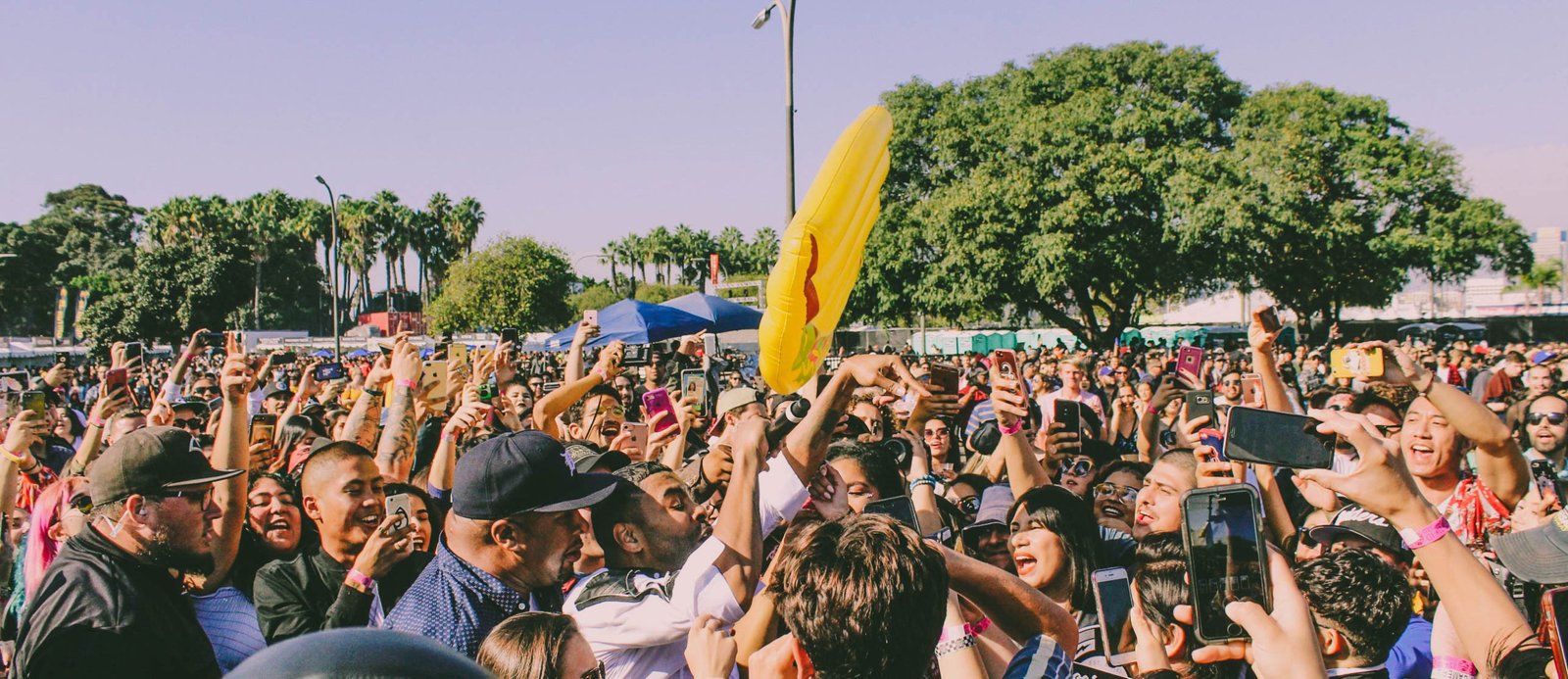Tropicália Fest began at an impromptu bus stop for yours truly, as it did for most other attendees. I parked and then boarded a free shuttle bus to one’s desire. The shuttle bus was a classic yellow school bus in my case. Sitting behind a starry-eyed couple, with whom I had become fast friends over, “I’m so excited about this,” and, “I can’t believe that!” What was more drama for our eventful ride to our destination point was the fact that some young woman sitting behind me found a sunglasses case on my seat. “Is that yours?” she said. Was it mine? I guess that the person who was sitting in my seat on the one or two shuttles before (I was there super early) forgot about it. What a way to begin a festival experience. I hope that person put their loss behind them.
My first friends were eccentrically dressed, like most who attended the festival: with rings, tight jeans, sunglasses, tattoos, and laughter: a whole lot of that. Most were Chicanos or Chicanas: LA’s young mix of Mexican origins, which have produced a culture of passionately loving both banda music and The Smiths. Like a good friend of mine, Josh, a Chicano, a somewhat long-haired UCLA Philosophy major surfer, and now manager of the Maui and Sons store on the Venice Beach boardwalk, put it: it’s not for the faint of heart. Shirts, dark black hair, shoes, language, and demeanour. Songs as entertainment, yes, but also songs as a motor for profound identity, born from both hurt and healing, was what had drawn these young people together to Long Beach California, for many a long drive from home. LA’s traffic is also no joke.
Backstage was an entirely different affair. It was quiet and calm, and very well-managed. Artists mingled with media people right by the water, near a bar that never had a line, unlike the bars outside. One very well-dressed young woman was Press Secretary at the LA Federation of Labor Unions. She was with an acquaintance, Jim, also in the labour movement, with whom I had once spoken to about a great Ostinato release on Haitian music (which we reviewed), and who I had recommended Haitian troubadour Manno Charlemagne to. “They’re giving out free joints” is what I heard but never saw.
Tropicália was founded in the late ‘60s in Sao Paulo Brazil as the coming together of musicians, actors, directors, and thinkers (mostly from Bahia and Sao Paulo) as an answer to Brazil’s downward spiral. At the time, bossa nova was the dominant music in Brazil. They did not push away Bossa nova. Instead, they produced something new out of loving what they love: concrete poetry, rock, dress, Brazil. Bossa nova is, as Albert Camus so well put it, love as the very best way to combat absurdity and to revolt. The Tropicália Fest organizers were inspired by the original movement, choosing to also wage war through love, for which one must purchase a ticket worth the price, given the 12 or so hours of non-stop music provided.
There was a major tunnel. On one side was the main stage, and the other side two smaller stages. The free tacos were being distributed where there were two smaller stages, where most of the R&B acts could be found playing. The lines were long and slow moving where there were free tacos, in an almost riot-like atmosphere. 4PM was the cut-off. I chose to join the vegan taco line, which moved tremendously quickly. No one wanted those, well, at least most people did not.
The music and vibes were incredible at the main stage. Celso Piña was a highlight, and so was Cuco, LA’s lover boy. The smell of marijuana and cigarettes gave it a cool that most music festivals have. I carried a black notepad as I walked through the crowds, observing the dancing, swaying back and forth for the most part, and waiting for the turning points. One band brought beautiful havoc to a jolly good time: Café Tacvba. They came on dressed ready to rock. They benefited from the sun coming down and did what they had to with what they had; with skills and instruments, they brought rock to the site, in that now mythical way of being human. It all felt like a myth as they played; the bards of beauty that begin when girls first apply their makeup as the first moments of what would be an odyssey through a festival of music and tacos.
Spanish and English languages are equal partners in expressing the satisfaction felt when hearing a great band play well. Os Mutantes, the only true Tropicália band in the line-up, was the most unique. The political theatre rock rode once again. Headliners Los Tigres Del Norte were the: “who are you here to see?” band, along with Chicano Batman.
No band, however, not even the pop sounds of Kali Uchis, delivered the electricity of rock at Tropicália Fest as much as Café Tacvba. The world is going to hell, as we can all see, and it is, therefore, liberty that will fuel our strength; rock’s streetwise elegant liberty, so often decadent, but sure to show the stars in our eyes and make a tale out of the night. That once-upon-a-time in November night, as the sun came down, in an old city hardened with cynicism, several musicians stood out and brought life to a people, for such is the way to an unforgettable memory.
Photo ©: Annemarie Larotonda


